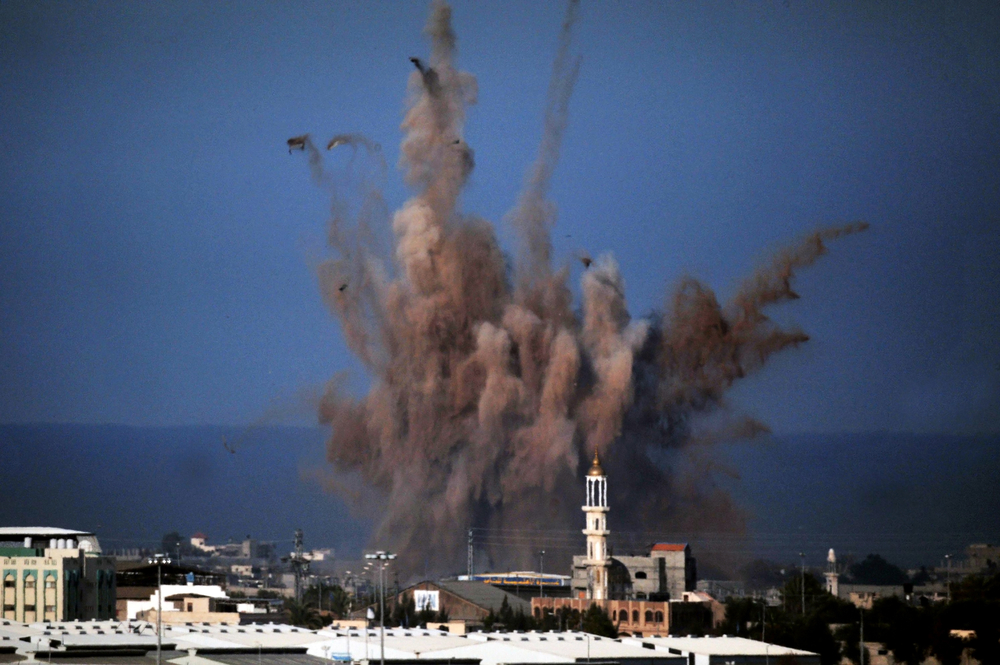
GAZA CITY, Gaza Strip — The target was the Gaza police chief. He survived the Israeli airstrike on a cousin’s home with critical injuries, but 18 family members were killed, including five children and teens.
The weekend attack highlighted Israel’s broad definition of military targets in its current offensive against the Islamic militant group Hamas. The army says those targets include senior Hamas activists and their homes, even as it insists it is doing the utmost to spare bystanders by warning them to clear out.
However, the U.N. Office for Humanitarian Affairs said Sunday that civilians made up the majority of Palestinian casualties over the past six days – 133 of 168 killed and nearly half of more than 1,100 wounded. And a human-rights researcher said some of Israel’s strikes appear to have violated rules of war.
The issue of Israel’s targets cuts to the core of conflicting narratives.
Palestinians – and not just those loyal to Hamas – say Israel is punishing all of Gaza’s 1.7 million people and is killing civilians with impunity. The situation in Gaza “has become unbearable,” Western-backed Palestinian President Mahmoud Abbas, a longtime rival of Hamas, said Sunday.
Israel has portrayed its offensive against Hamas as self-defense, saying it is trying to halt the group’s indiscriminate rocket attacks on Israeli communities. Gaza militants have fired more than 800 rockets over the past week, disrupting life in large parts of the country but so far causing no deaths, according to the Israeli military.
A senior army commander said Sunday that Israel is trying to cause maximum damage to Hamas, which seized Gaza in 2007 and seeks Israel’s destruction. The military sometimes holds back because of concern for civilians, said the officer who briefed reporters on condition of anonymity, citing military regulations.
“I could kill a lot more Hamas commanders, but the way I’m operating now is consistent with my values and my conscience,” he said.
Trying to highlight its attempts to warn civilians, the military released a recording of a phone call to a resident in an area about to be targeted. The caller is heard saying he is speaking on behalf of the Israeli army.
“You speak Hebrew? Excellent,” he says to the Palestinian on the other line – in Hebrew. He then urges residents to clear out because a house is about to be targeted. “In five minutes, we are bombing,” the Israeli says.
Members of the extended family of Taysir al-Batsh, the police chief in Gaza, said they did not receive any call before Israel flattened the two-story home of one of the chief’s cousins late Saturday, just as worshippers streamed out of a nearby mosque after evening prayers.
Al-Batsh was in stable condition Sunday at Gaza City’s Shifa Hospital. Eighteen of his relatives were killed, said Dr. Ayman Sahabani at Shifa.
Among the dead were the owners of the home, Majed and Amal al-Batsh, their seven children ranging in age from 13 to 28, and a 2-year-old granddaughter, according to the Palestinian Center for Human Rights. Also among the dead were two more children, ages 7 and 12, and a 17-year-old from other branches of the clan.
Clan member Kamel al-Batsh, 22, said he heard the strike while he was in the mosque and then rushed to the scene.
“In a second, the place became a mass of dust and destruction, mixed with blood and body parts,” he told a radio station.
“My cousins who I used to play with … shared joy and sad moments with, have gone,” al-Batsh said. “What did we do for them to target our clan? Is it because of Uncle Taysir? He was not hiding. From the first day, he was working all day long in the street. He is the police commander who cared about people safety and stability.”
An Israeli army spokesman, Lt. Col. Peter Lerner, said the police chief had been a target but that other militants were also in the area. Lerner said it was not clear if a warning was given before the strike and that the military is looking into the matter.
Lerner accused Hamas of using civilians as human shields.
“Hamas chooses to operate and hold the civilian population of Gaza hostage,” he said. “If they have a command-and-control room and next door is a living room, they are jeopardizing everyone in that building.”
However, the Israeli human-rights group B’Tselem said Israel is overreaching.
“Official spokespeople state that it is enough for a person to be involved in military activity to render his home (and his neighbors’ homes) legitimate military targets, without having to prove any connection between his activity and the house in which he and his family live,” B’Tselem said. “This interpretation is unfounded and illegal.”
Palestinian human-rights groups in Gaza said Israel has directly targeted at least 171 homes since the start of the offensive.
The military would only say that in addition to rocket-launching sites and weapons-storage facilities, it struck 32 “Hamas leadership facilities, 29 communications infrastructures and additional sites used for terrorist activities.”
Bill van Esveld of the New York-based group Human Rights Watch said that in some cases, Israel appears to have violated the rules of war under which parties to the conflict can only target military objects using proportionate force.
“We’ve looked into several cases that look like unlawful attacks,” he said. “And we’re very concerned by other attacks with high numbers of civilian casualties, often attacks on homes.”
Associated Press writers Yousur Alhlou and Peter Enav in Jerusalem and Ibrahim Barzak in Amman, Jordan, contributed to this report.